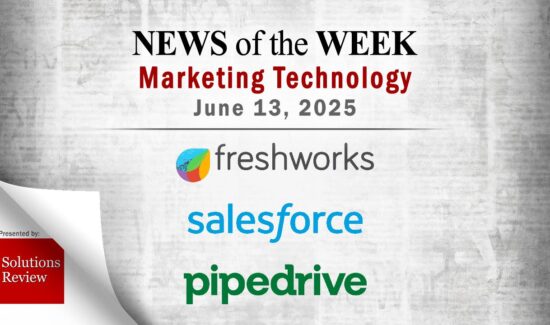What’s Changed: 2024 Gartner Magic Quadrant for Content Marketing Platforms


The editors at Solutions Review highlight and summarize the key takeaways and updates in Gartner’s 2024 update of the Magic Quadrant for Content Marketing Platforms.
Analyst house Gartner, Inc. recently released the 2024 version of its Magic Quadrant for Content Marketing Platforms. Gartner defines Content Marketing Platforms (CMP) as software solutions that help businesses create and curate text, video, graphics, images, audio, e-books, white papers, and other interactive content assets across paid, owned, and earned media channels. These platforms aim to help brands engage with customers, nurture prospects down the sales funnel, and drive loyalty with personalized materials.
According to Gartner’s report, a content marketing platform’s standard capabilities include tools for content strategy, editorial planning, calendarization, content creation, collaborative workflows, approvals, content performance measurement, and integrations with other marketing technologies (e.g., marketing automation, sales enablement, and web content management) via standalone or suite-based solutions.
What’s Changed: 2024 Gartner Magic Quadrant for Content Marketing Platforms
In this updated Magic Quadrant, Gartner identifies ten of the most significant Content Marketing Platform providers in the marketplace. The researchers behind the report—Nicole Greene, Jeffrey L. Cohen, Rene Cizio, and Carlos Guerrero—evaluated the strengths and weaknesses of each provider listed and ranked them on the signature “Magic Quadrant” graph, which illustrates each vendor’s ability to execute its vision. The diagram includes four quadrants: leaders, challengers, niche players, and visionaries.
To qualify for the report, each vendor must meet specific criteria by December 1st, 2023. Those criteria include generating a minimum of $5 million in annual revenue or a minimum of $2 million in annual revenue and 30 percent year-over-year growth compared to 2022, and integrated support for five of the six following capabilities—content strategy, editorial planning and calendarization, creative workflow, distribution, content performance measurement, and out-of-the-box integrations.
Below is a breakdown of each category and the companies associated with it. Solutions Review’s summary of last year’s report is available here.
Leaders
Optimizely is the first Leader in the category, offering a suite-based solution with robust structured content and distribution capabilities. It primarily works with enterprise B2B organizations in manufacturing, insurance, travel and hospitality, and technology markets across North America and Western Europe. Gartner highlights its strengths: its adaptable product roadmap, expanded AI functionalities, ability to enable distributed teams, and overall viability in the CMP marketplace.
Storyteq provides a content marketing platform with ideation insight, workflow, planning, metadata, content storage, distribution, and content performance analytics capabilities. It works with enterprise and mid-market organizations across B2C and B2B verticals and industries. Strengths as a CMP vendor include its integrations with AI, content connectivity, and ongoing investments in AI tools, which Gartner says are “advanced” compared to other providers in the market.
Sitecore moved into the Leaders category in this year’s Magic Quadrant, a change from its placement in Visionaries last year. The company’s CMP solution uses modular content to support mid-market and enterprise clients seeking personalized experiences. Sitecore differentiates itself in content marketing with its innovative AI Copilot tool, AI-assisted Content Hub Suite, and its broader suite-based strategy, which can help customers leverage GenAI for their content marketing efforts.
Skyword and its Skyword360 solution return to the Leader category in this year’s Magic Quadrant. It primarily works with B2B and B2C companies based in North America, emphasizing large-enterprise organizations in the banking, communications, healthcare, insurance, and retail industries. Gartner says Skyword “distinguishes” itself in the marketplace with its in-depth strategic support, robust talent marketplace, streamlined customer experience, and evolving product roadmap, which balances AI technologies with human-centric strategic involvement.
Challengers
Adobe is one of the new companies added to Gartner’s Magic Quadrant. Its products include Adobe Workfront, Adobe Experience Manager (AEM Assets and AEM Sites), Adobe Journey Optimizer, Adobe Customer Journey Analytics, and Adobe Express with Adobe Firefly, which collectively supports workflow, planning, production, creation, delivery, activations, asset management, reporting, and insights capabilities. Its strengths include its track record of innovation and overall viability in the market, courtesy of its global reach and year-over-year growth.
Acquia is the other newcomer to this Magic Quadrant. While it doesn’t market itself as a content marketing platform (CMP) provider, it offers content management, analytics, personalization, and customer journey management features alongside a customer data platform. The company earns its spot in the report with a suite-based solution that includes an open-source Drupal CMS, CDP, DAM, and DXP, providing B2C and B2B companies with the tools they need to support their content marketing efforts. Other strengths include its strategy for innovation and its process of incorporating real-time user feedback into platform updates.
Niche Players
Contently is back as a Niche Player. Its CMP is a legacy solution that provides North American companies in B2B markets with the features required for content creation through distribution. According to Gartner, Contently’s strengths stem from its focus on helping clients make productivity improvements, its responsive account team that helps provide better customer experiences, and a talent marketplace to enable operations with customer workflows capable of scaling content across teams.
CoSchedule supports content marketing and social publishing use cases with its Marketing Suite, calendars, and add-on offerings. This is a different approach than other vendors in the CMP marketplace, as it provides clients with an out-of-the-box solution that can be easily configured to the needs of vertical industries. Other differentiating qualities include its streamlined implementation programs, customer support services available to Enterprise customers, and its release cadence, which keeps customers happy without overwhelming them with new features.
Upland is the final vendor in this year’s report since Gartner didn’t place any companies in the Visionaries category. Its content marketing operations solution is Upland Kapost, which can help B2B organizations create and distribute content that supports complex buying journeys. The company benefits from a marketing strategy that prioritizes B2B enterprise customers, a simple pricing tier structure, and the customer support it offers via its community forum, dedicated customer success managers, and other support services.




















